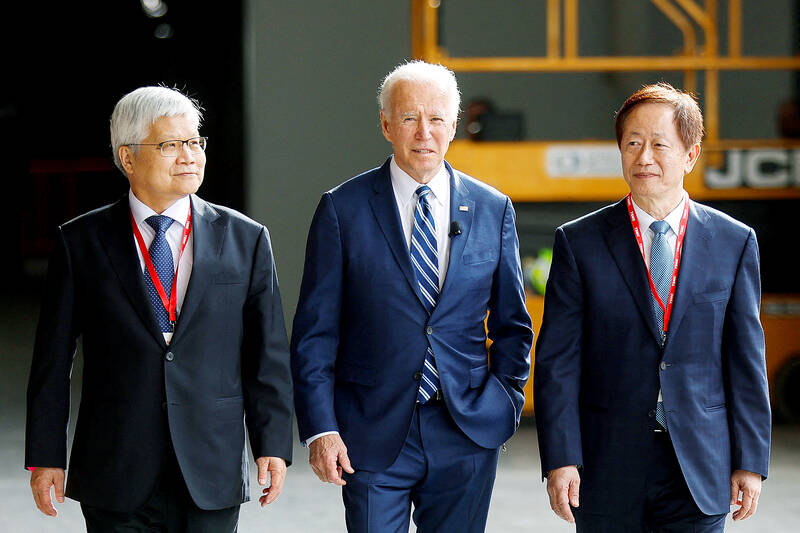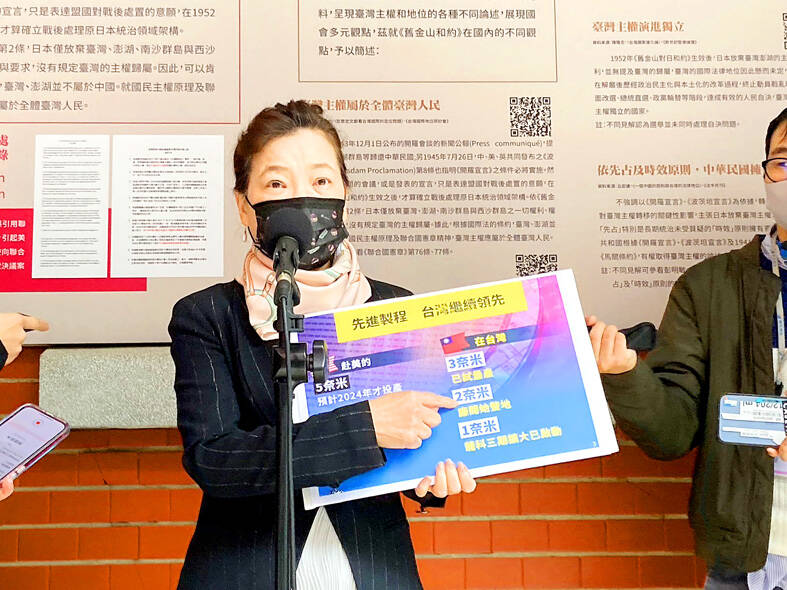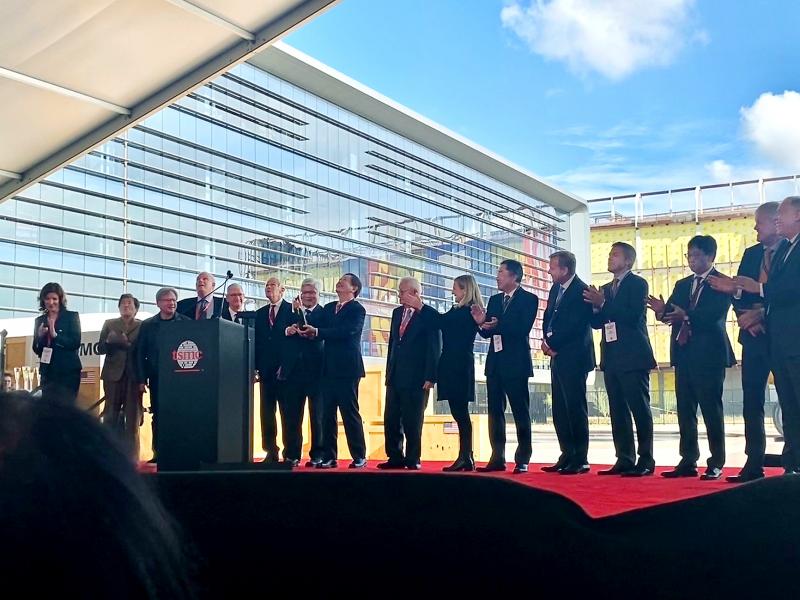"De-Taiwanization” due to Taiwan Semiconductor Manufacturing Co’s (TSMC, 台積電) investments in the US would not happen, Minister of Economic Affairs Wang Mei-hua (王美花) said yesterday, adding that TSMC chief executive officer C.C. Wei (魏哲家) has also emphasized that such a scenario is impossible.
TSMC, the world’s largest contract chipmaker, began construction of a US$12-billion plant in Arizona about 18 months ago with the aim of having it begin commercial production in 2024 using the 5nm process.

Photo: Reuters
However, just hours before United States President Joe Biden’s visit to "First Tool-In" ceremony at the TSMC facility, TSMC announced that it had started the construction of a second fab in Phoenix, Arizona, that will use more advanced 3nm process technology when production begins in 2026.

Photo courtesy of Ministry of Economic Affairs
It also said it intended to make 4nm chips at the first plant instead of 5nm chips as originally planned.
TSMC investment in Arizona could be “a gamechanger,” US President Joe Biden said on Tuesday (US time) during his visit to the site of TSMC’s first chip plant in the state, hailing it as bolstering manufacturing in the US.

Photo courtesy of National Development Council
“TSMC is investing US$40 billion dollars here in Arizona, the largest foreign investment in the history of this state,” Biden said after making a tour of TSMC’s 4-nanometer fab that is still under construction.
In Taipei, some worry that an outflow of talent and technology might lead to the nation’s “de-Taiwanization” with TSMC investing heavily in the US.
“TSMC has a research and development center, and a complete supply chain in Taiwan,” Wang told reporters in Taipei. “The chipmaker’s 3-nanometer fab in Taiwan has started trial production and it is seeking to appropriate land for a planned 2-nanometer fab in places including [Hsinchu County’s] Baoshan Township (寶山) and Taichung.”
“The government is also working on the third expansion phase of the Longtan Science Park (龍潭科學園區) [in Taoyuan] to prepare for TSMC’s 1-nanometer plant,” she said. “With Taiwan’s complete supply chain and ecosystem, coupled with government efforts, Taiwan continues to be TSMC’s most important production base.”
TSMC would also take into account protecting its business secrets, such as technology patents, when investing in the US, she said.
“TSMC is well known globally for its protection of trade secrets,” Wang added.
On Saturday, Wei was asked whether an “outflow of talent” to Arizona might “hollow” Taiwan’s semiconductor industry.
It would not happen, he said.
Taiwan’s semiconductor industry has worked hard to build a solid production and supply chain over the past 30-plus years, so “it is impossible for it to be knocked down,” Wei said.
National Development Council Minister and TSMC board member Kung Ming-hsin (龔明鑫) also dismissed concerns about the loss of key technologies and talent.
Kung, who attended TSMC's tool-in ceremony in the US on Tuesday, said TSMC's planned capacity in the US factories accounts for about 3-4 percent of its total capacity, so there are no such concerns about "de-Taiwanization" at all.
"TSMC will definitely keep the most advanced technology and manufacturing process in Taiwan, and the factories in Taiwan will also be the most profitable ones in the world," he said.
A semiconductor veteran also believes that vast majority of TSMC's advanced process technologies are still in Taiwan and there is no need to exaggerate the issue of these engineers moving from home to overseas as a brain drain problem.
"In fact, it is a good thing," former TSMC vice president in research and development Lin Burn-jeng (林本堅) said in a recent interview with CNA. The 80-year-old Lin now heads the College of Semiconductor Research at the National Tsing Hua University in Hsinchu.
According to Lin, anyone who has the opportunity to work in a foreign country should grab the chance because it helps Taiwanese learn how people overseas think and their way of doing things. "This can help broaden one's working experience," he said.
Additional reporting by Chen Cheng-hui

SECURITY: As China is ‘reshaping’ Hong Kong’s population, Taiwan must raise the eligibility threshold for applications from Hong Kongers, Chiu Chui-cheng said When Hong Kong and Macau citizens apply for residency in Taiwan, it would be under a new category that includes a “national security observation period,” Mainland Affairs Council (MAC) Minister Chiu Chui-cheng (邱垂正) said yesterday. President William Lai (賴清德) on March 13 announced 17 strategies to counter China’s aggression toward Taiwan, including incorporating national security considerations into the review process for residency applications from Hong Kong and Macau citizens. The situation in Hong Kong is constantly changing, Chiu said to media yesterday on the sidelines of the Taipei Technology Run hosted by the Taipei Neihu Technology Park Development Association. With

A US Marine Corps regiment equipped with Naval Strike Missiles (NSM) is set to participate in the upcoming Balikatan 25 exercise in the Luzon Strait, marking the system’s first-ever deployment in the Philippines. US and Philippine officials have separately confirmed that the Navy Marine Expeditionary Ship Interdiction System (NMESIS) — the mobile launch platform for the Naval Strike Missile — would take part in the joint exercise. The missiles are being deployed to “a strategic first island chain chokepoint” in the waters between Taiwan proper and the Philippines, US-based Naval News reported. “The Luzon Strait and Bashi Channel represent a critical access

‘FORM OF PROTEST’: The German Institute Taipei said it was ‘shocked’ to see Nazi symbolism used in connection with political aims as it condemned the incident Sung Chien-liang (宋建樑), who led efforts to recall Democratic Progressive Party (DPP) Legislator Lee Kun-cheng (李坤城), was released on bail of NT$80,000 yesterday amid an outcry over a Nazi armband he wore to questioning the night before. Sung arrived at the New Taipei City District Prosecutors’ Office for questioning in a recall petition forgery case on Tuesday night wearing a red armband bearing a swastika, carrying a copy of Adolf Hitler’s Mein Kampf and giving a Nazi salute. Sung left the building at 1:15am without the armband and apparently covering the book with a coat. This is a serious international scandal and Chinese

COUNTERINTELLIGENCE TRAINING: The ministry said 87.5 percent of the apprehended Chinese agents were reported by service members they tried to lure into becoming spies Taiwanese organized crime, illegal money lenders, temples and civic groups are complicit in Beijing’s infiltration of the armed forces, the Ministry of National Defense (MND) said in a report yesterday. Retired service members who had been turned to Beijing’s cause mainly relied on those channels to infiltrate the Taiwanese military, according to the report to be submitted to lawmakers ahead of tomorrow’s hearing on Chinese espionage in the military. Chinese intelligence typically used blackmail, Internet-based communications, bribery or debts to loan sharks to leverage active service personnel to do its bidding, it said. China’s main goals are to collect intelligence, and develop a